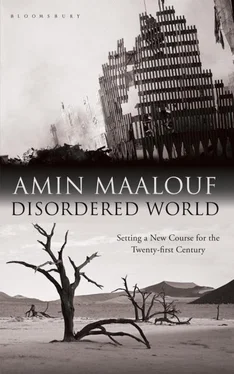Without seeing earlier times — which had their share of malpractice and crises — through rose-tinted spectacles, it has to be admitted that there has never been a period quite like our own in which those who are responsible for national economies can no longer follow the acrobatic manipulations of the financial whizz kids, and in which operators who handle billions have no knowledge of political economy or the least concern about the repercussions of their actions on businesses, workers, or their own relatives and friends, without even mentioning the collective good.
It is easy to understand how old sages might become disenchanted. Whether they incline towards interventionism or laissez-faire, the doctors of the economy report disappointing results for their tried and tested therapies, as though they found themselves in front of a different patient from the one they treated the day before.
But this economic malaise may be just one aspect of a bigger, more complex phenomenon that affects all human societies without exception, rich or poor, weak or powerful, a phenomenon we still refer to as the ‘acceleration of history’ but which goes far beyond what that meant last century. Perhaps it would be preferable to use another concept which better reflects the pace of change today: instantaneity . For, as so many examples show us every day, all world events now unfold in real time before the eyes of the whole of humanity.
It is no longer simply a matter of the pattern that has been imprinted on history for a long time — the accelerating movement of peoples, goods, images and ideas creating the impression of a shrinking world. We have got used to that over time. But the tendency became considerably more pronounced in the final years of the twentieth century, to the extent that one could say the phenomenon had changed its nature with the take-off of the internet, the ubiquity of email and the construction of the worldwide web, as with the development of some other means of instant communication such as the mobile phone, which established instant links between people wherever they were, abolishing distance, reducing reaction times to nothing, amplifying the impact of events; and as a result increasing the speed at which they unfold.
That probably explains how the considerable upheavals, which in other centuries would have taken decades to unfold, now happen in the space of a few years or even months — for both better and worse. The first example that comes to mind is the uprooting in the space of a few years of cultures which had survived for millennia; but one could also think of the collapse of the Soviet Union, the expansion of the European Union, the growth of India and China, the rise of Barack Obama and a thousand other dramatic events.
Clearly the twenty-first century has begun in a mental atmosphere perceptibly different from any that humanity has known previously. It is a fascinating but dangerous change. To anyone interested in progress, the web today opens limitless perspectives: instead of just reading your local daily paper, you can look at the whole world’s press while drinking your morning coffee at home, and especially if you read English, given that innumerable papers — in Germany, Japan, China, Turkey, Israel, Iran, Kuwait, Russia, etc — now publish an online edition in that language. For my part, I could lose myself in them for days on end without getting tired, in a state of amazement and the feeling of fulfilling a dream.
In Lebanon in my childhood I used to read all of the local press every morning. My father was editor of a daily paper and out of courtesy would send a copy of it to his colleagues on other papers, who would reciprocate by sending him theirs. ‘Which one should I believe?’ I asked him one day, pointing at the pile. Without interrupting his reading, he answered, ‘None of them and all of them. None of them will tell you the whole truth, but each of them will give you its own version of it. If you read them all, and are able to exercise discrimination, you’ll understand the essential.’ My father did the same thing with radio stations: first the BBC, then Lebanese radio, then Cairo, followed by the Arabic-language broadcasts from Israeli radio; sometimes also Radio Damascus, Voice of America, Radio Amman or Radio Baghdad. By the time he had drained his coffee pot, he felt sufficiently well informed.
Often I think of the joy he would have felt if he could have experienced our era. There is no need to be the editor of a newspaper to receive all your country’s media and that of the whole world at home, much of it free of charge. Anyone who wants to have a relevant, balanced, all-embracing view of what is really going on in the world has all they need at their fingertips.
But not everyone makes such use of the tools at their disposal. Not everyone wants to form a considered opinion. It is often the obstacle of language which prevents them from broadening the range of voices they listen to. But there is also an attitude of mind which is very common in all nations, which means that only a small minority feels the desire to hear what others are saying; many people make do with the version that flatters their own views.
For every person who navigates from one cultural universe to another with their eyes wide open, for every person who goes happily from the Al-Jazeera site to that of Haaretz, and from the Washington Post to the Iranian press agency, there are thousands who only visit their compatriots and fellow believers, who imbibe only from familiar sources, who only want to confirm their certainties and justify their resentments in front of their screens.
So much so that this amazing modern tool, which ought to encourage harmonious mixing and exchange between cultures, becomes instead a rallying and mobilisation point for the world’s tribes. Not by dint of some conspiracy, but because the internet, which accelerates and amplifies effects, took off at a moment in history when identities were being unleashed, the clash of civilisations was being established and universalism was crumbling, the nature of debates was becoming corrupted, violence was taking precedence in words and deeds, and common reference points were becoming lost.
It is not without significance in this context that this major technological advance, which radically changed relations between people, coincided with a strategic disaster of the first order, namely the end of the confrontation between the two great planetary blocs, the disintegration of the Soviet Union and the socialist camp, the emergence of a world in which differences of identity have taken over from ideological differences, and the advent of a single superpower which unwillingly exerts de facto hegemony the length and breadth of the planet.
I sometimes reread a dense little text published in 1973 by the British historian Arnold Toynbee shortly before his death. Surveying the trajectory of humanity, to which he had devoted a magisterial study in twelve fat volumes, A Study of History , he distinguished three phases.
In the course of the first phase, which corresponds more or less to prehistory, people’s lives were the same because ‘however slow communication was, the pace of change was even slower’. Every innovation had time to spread to all societies before another came along.
During the second phase, which according to Toynbee lasted around four and a half millennia from the end of prehistory to about 1500 CE, change became more rapid than the speed of transmission, with the result that human societies became markedly different. It was during this phase that distinct religions, ethnicities and civilisations came into being.
Finally, from the sixteenth century, ‘because the speed of change has been outstripped by the acceleration of the speed of communication’, our habitat has begun to unify, at least technologically and economically, ‘but not yet on the public level,’ Toynbee observed.
Читать дальше












